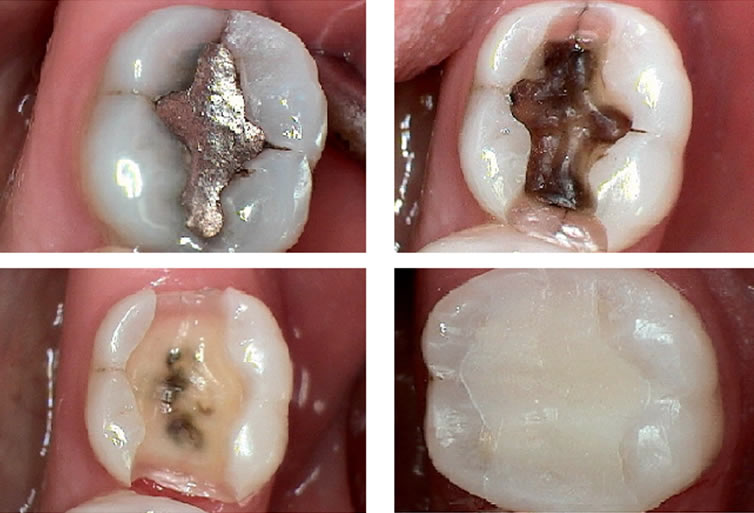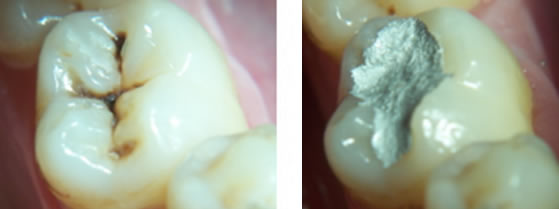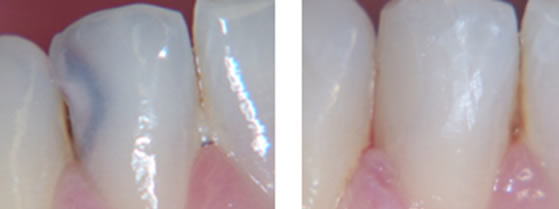Fillings are used to repair a cavity in your tooth caused by decay. The most common type of filling is dental amalgam, made from a mixture of mercury and different metals. Dental amalgam fillings are often used on your back teeth as they’re hard-wearing..
We will offer the most appropriate type of filling according to your clinical needs. This includes white fillings, if appropriate.

Silver Fillings
What are they?
A Filling replaces part of a tooth that has been lost because of decay or through accidental damage.
Silver coloured fillings are made of amalgam which is a mixture of mercury with other metals such as silver, tin and copper. Amalgam is soft at first but quickly becomes hard once placed in the tooth.

What will my dentist do?
Your dentist will:
- Usually numb the area around the tooth with an injection (some small fillings may not need an anaesthetic)
- Remove any decay, together with any old filling material.
- Sometimes they will use tiny pins and screws to help hold the tooth and filling together.
- Put a lining underneath the filling, to help make the tooth less sensitive to hot and cold temperatures.
- Press soft amalgam tightly into the hole. You might hear it squeak as it gets packed.
- Carve the filling to fit the tooth. The dentist might use a thin metal band around the tooth to help them shape the tooth.
- Ask you to close your mouth gently on the filling to check it is at the right height and is comfortable.
What are the benefits?
A filling rebuilds the tooth so you can chew properly.
If decay is left, it can spread through the tooth, causing pain and infection and this could even result in the tooth requiring to be taken out.
Silver fillings are strong and so are ideal for the back teeth which are involved in chewing. They can however turn black over time. White fillings are also available, but the NHS will not currently pay for them to be placed on biting surfaces of back teeth. This is because white fillings do not wear as well as silver fillings during chewing.
White Fillings
A Filling replaces part of a tooth that has been lost because of decay or through accidental damage.
White fillings are called either Composite or Glass Ionomer.

What will my dentist do?
Your dentist will:
- Usually numb the area around the tooth with an injection (some small fillings may not need an anaesthetic)
- Remove any decay, together with any old filling material.
- Wash and dry the tooth by blowing water then air on it (the dentist will be using something which looks like a water pistol)
- Use a blue gel to clean and etch the tooth surface to help the filling to stick to the tooth.
- Coat the surface with a varnish which will help the filling to stick to the tooth.
- Place the filling into the cavity and shape it as required.
- Harden the filling by pointing a bright blue light at it. The dentist and dental nurse will use an orange shield to protect their eyes.
- Trim and polish the filling as necessary.
What are the benefits?
Unlike silver (amalgam) fillings, white fillings stick to the teeth. They are also set using the light in the surgery so you can eat on the filling straight away.
White fillings are less noticeable than silver fillings. They come in a range of shades so they can be match to the colour of your own teeth.
White fillings are usually placed on front teeth. They can sometimes be used to fill back teeth, although the NHS will not pay for this. This is because they are seen as cosmetic. White fillings will take longer to place than a metal filling and the area needs to be kept very dry during placement for them to work well. If you would prefer to have white fillings please let us know, these will have to be provided privately for you and require to be paid for when they are placed.
Sometimes if a tooth has either had a very large filling or has a lot of decay it may not be suitable for a white filling and we may recommend a crown (sometimes called a cap) instead. These can be tooth coloured also, on a molar tooth this would have to be paid for privately.
If you would like to have a white filling placed on one of your back teeth please discuss this with your dentist. They will advise you if it will be possible or not and they will be happy to let you know how much it will cost.
“Big thanks to lovely Lyall for calming my nerves and being very understanding during my treatments over the last few months, so nice and always checking I was ok! Highly recommend!”
Lynne Guthrie
Please call us on 01475 741 186 or click here to book an appointment, or click here for our services.

Contact Us
Opening Times
| Monday | 0830 – 1830 |
| Tuesday | 0830 – 1830 |
| Wednesday | 0830 – 1830 |
| Thursday | 0830 – 1830 |
| Friday | 0830 – 1645 |

